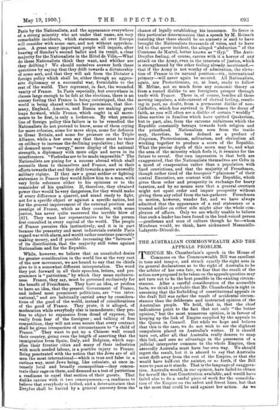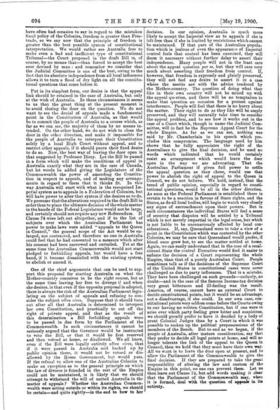THE AUSTRALIAN COMMONWEALTH AND THE APPEALS PROBLEM. T HOUGH Mr. Chamberlain's
speech in the House of Commons on the Commonwealth Bill was excellent in tone and temper, and struck exactly the right note in its general declarations as to the right of Australia to be the arbiter of her own fate, we fear that the result of the action now proposed to be taken on the appeals question may not turn out to be the best possible in the existing circum- stances. After a careful consideration of the accessible facts, we think it probable that Mr. Chamberlain is right in assuming that the forbidding of constitutional appeals in the draft Bill was rather the result of accidental circum- stances than the deliberate and instructed opinion of the Australian people. We hold, that is, that the chief indications point to the fact that not only "the better opinion," but the most numerous opinion, is in favour of keeping up the link of Empire supplied by the appeals to the Queen in Council. But while we hope and believe that this is the case, we do not wish to see the slightest compulsion placed on Australia's wishes. If it should turn out, after all, that Australia really desires to snap this link, and sees no advantage in the possession of a judicial interpreter common to the whole Empire, then assuredly Australia must have her own way. We should regret the result, but it is absurd to say that Australia must drift away from the rest of the Empire, or that she would have half-cut the painter, or so forth, if the Bill were to pass as it stands. That is the language of exaggera- tion. Australia would, in our opinion, have failed to obtain for herself the best Constitution available, and would have failed also to do a useful piece of work for the consolida- tion of the Empire on the safest and freest lines, but that is the most that could be said against her action. As we have often had occasion to say in regard to the mistaken fiscal policy of the Colonies, freedom is greater than Free- trade, so we say now that the principle of freedom is greater than the best possible system of constitutional interpretation. We would rather see Australia free to make even a bad and inefficient type of constitutional Tribunal—the Court proposed in the draft Bill is, of course, by no means that—than forced to accept the best ever devised by man : and remember we consider that the Judicial Committee is one of the best, owing to the fact that its absolute independence from all local influences allows it to turn a flood of dry light on all the constitu- tional questions that come before it.
Put in its simplest form, our desire is that the appeal link should be retained in the case of Australia, but only at the wish of Australia. In these circumstances it seems to us that the great thing at the present moment is to avoid closing the door on the question. We do not want to see the denial of appeals made a fundamental point in the Constitution of Australia, as that would be to commit the people of Australia to a course which, as far as we can see, the majority of them by no means in- tended. On the other hand, we do not wish to close the door in the other direction, and make it impossible for the people of Australia to interpret their Constitution solely by a local High Court without appeal, and to restrict other appeals, if it should prove their fixed desire to do so. Now, the best way of leaving the door open is that suggested by Professor Dicey. Let the Bill be passed in a form which will make the conditions of appeal in Australia exactly what they are in the case of Canada, but let words be added giving the Legislature of the Commonwealth the power of amending the Constitu- tion in respect to appeals, and of making any arrange- ments in regard to them that it thinks fit. In this way Australia will start with what is the recognised Im- perial system as to appeals in a Federation of Colonies, but will have power to alter that system if she desires so to do. We presume that the alterations required in the draft Bill in order thus to place the ultimate decision of the whole matter in the hands of the Federal Legislature would not be large, and certainly should not require any new Referendum. If Clause 74 were left out altogether, and if to the list of subjects over which the Australian Parliament has power to make laws were added "appeals to the Queen in Council," the general scope of the Act would be en- larged, not contracted, and therefore no one in Australia could feel that he had consented to a measure which after his consent had been narrowed and curtailed. Yet at the same time the Australian Commonwealth would not start pledged to forbidding appeals, but would have a free hand, if it became dissatisfied with the existing system, to abolish or amend it.
One of the chief arguments that can be used to sup- port this proposal for starting Australia on what the Mother-country conceives to be the right course, but at the same time leaving her free to diverge if and when she desires, is that even if the opposite proposal is adopted, there is always the risk of the Australian Parliament legis- lating on the subject of appeals and refusing to con- sider the subject ultra vires. Suppose that it should turn out after all that Australia is determined to interpret her own Constitution, and practically to cut off the right of private appeal, and that as the result of this determination a Bill forbidding appeals were to be passed in due form by the Parliament of the Commonwealth. In such circumstances it cannot be seriously argued that the Governor would be instructed to veto the Bill, or that it would be first reserved and then vetoed at home, or disallowed. We all know, even if the Bill were legally entirely ultra vires, that if it were passed in Australia and backed up by public opinion there, it would not be vetoed or dis- allowed by the Home Government, but would pass. If the refusal to allow one of the Australian Colonies to make an exception as to the general principle on which the law of divorce is founded in the rest of the Empire could not be maintained, is it likely that we should attempt to withstand the will of united Australia in the matter of appeals ? Whether the Australian Common- wealth were acting outside or within its rights, we should be certain—and quite rightly—in the end to bow to her decision. In our opinion, Australia is much more likely to accept the Imperial view as to appeals if she is left free than if she is limited by restrictions which cannot be maintained. If that part of the Australian popula- tion which is jealous of even the appearance of Imperial control feels that control has been exercised, they will deem it necessary without further delay to assert their independence. Many people will not in the least care about the appeal question per se, but they will care very much about asserting their freedom from control. If, however, that freedom is expressly and plainly preserved, they will not feel any desire to assert it in a case where the merits are with the advice tendered by the Mother-country. The question of doing what they like in their own country will not be mixed up with the appeal question, and there will be no temptation to make that question an occasion for a protest against interference. People will feel that there is no hurry about the matter. Their right to do as they like will be amply preserved, and they will naturally take time to consider the appeal problem, and to see how it works out in the case of a Court which, though in name the Judicial Com- mittee, will in fact be the Supreme Appeal Court for the whole Empire. As far as we can see, nothing was said by Mr. Chamberlain in his speech which pre- cludes this compromise. The language used by him shows that he fully appreciates the right of the Australians to give the final decision, and he used no words which indicated that he would certainly resist an arrangement which would leave the door open in the way we are advocating. That the Australian Parliament if given full power to settle the appeal question as they chose, would use that power to abolish the right of appeal to the Queen in Council, we do not believe. We hold, instead, that the trend of public opinion, especially in regard to consti- tutional questions, would be all in the other direction. As soon as the Federal Parliament is established there is certain to be a reaction in favour of State rights, and the States, as do all local bodies, will begin to watch very closely any signs of encroachment upon their powers. But in such circumstances the individual States will feel a sense of security that disputes will be settled by a Tribunal which is not merely impartial in the legal sense, but which is not liable to be unconsciously affected by local con- siderations. If, say, Queensland were to take a view of a point in the Constitution which was contested by the other Colonies, we may be sure that Queensland would prefer, if blood once grew hot, to see the matter settled at home. Again, we can easily understand that in the case of a recal- citrant State the central Executive would find it easier to enforce the decision of a Court representing the whole Empire, than that of a purely Australian Court. People sometimes talk as if the decisions of the Supreme Court of the United States in constitutional cases were never challenged as due to party influences. That is a mistake. They have been challenged on such grounds—unfairly, no doubt—and in the case of the famous Income-tax decision very great bitterness and ill-feeling was the result. America, of course, cannot have an external Court to decide constitutional points, but it would be an advantage, not a disadvantage, if she could. In our own case, con- stitutional points very seldom come before the Courts owing to our having no written Constitution, but if one were to arise over which party feeling grew bitter and suspicious, we should greatly prefer to have it decided by a body of great Colonial Judges than by a Court in which it was possible to reckon up the political prepossessions of the members of the Bench. But to end as we began, if the people of Australia. after mature consideration, say that they prefer to decide all legal points at home, and will no longer tolerate the link of the appeal to the Queen in Council, then we hold that they must have their own way. All we want is to leave the door open at present, and to allow the Parliament of the Commonwealth to give the final decision. If they are prepared to take the great responsibility of altering the law and custom of the Empire in this point, no one can prevent them. Let us then leave out Clause 74, but add words making it clear that the Parliament of the Commonwealth may, when it is formed, deal with the question of appeals in its entirety.







































 Previous page
Previous page